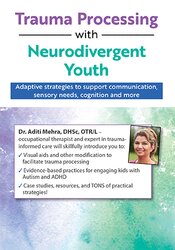
×

Each child’s path to healing is as unique as their fingerprint.
But when kids with autism, ADHD, and developmental delays are also facing trauma, the way forward can seem impossible to find.
Communication impairments. Concrete thinking. Sensory needs.
It can start to feel like a puzzle you’ll never solve. A door you can’t unlock.
Often, the trauma gets overshadowed by the more visible needs, becoming an unseen barrier preventing progress.
Watch Dr. Aditi Mehra, occupational therapist and trauma expert, to gain the specialized knowledge to provide the comprehensive support these children need:
Return to work tomorrow with dozens of tools for your toolbox, including an extensive resource list for worksheets, social stories, visual supports, art therapy, and sensory activities you can implement immediately.
Purchase today for this crucial training to help the most vulnerable children on their path to healing.
All members of the PESI, Inc. planning committee have provided disclosures of financial relationships with ineligible organizations and any relevant non-financial relationships prior to planning content for this activity. None of the committee members had relevant financial relationships with ineligible companies or other potentially biasing relationships to disclose to learners. For speaker disclosures, please see the faculty biography.
NOTE: Tuition includes one free CE Certificate (participant will be able to print the certificate of completion after passing the online post-test (80% passing score) and completing the evaluation). Instructional methods will include PowerPoint, didactic lecture, and others.
Continuing Education Information: Listed below are the continuing education credit(s) currently available for this non-interactive self-study package. Program content is reviewed periodically per accrediting board rules for currency and appropriateness for credit. Credit approvals are subject to change. Please note, your licensing board dictates whether self-study is an acceptable form of continuing education, as well as which credit types are acceptable for continuing education hours. Please refer to your licensing board's rules and regulations. If your profession is not listed, please contact your licensing board to determine your continuing education requirements and check for reciprocal approval.
For other credit inquiries not specified below, please contact info@pesi.com or 800-844-8260 before purchase.
Materials that are included in this course may include interventions and modalities that are beyond the authorized practice of your profession. As a licensed professional, you are responsible for reviewing the scope of practice, including activities that are defined in law as beyond the boundaries of practice in accordance with and in compliance with your profession's standards.
For Planning Committee disclosures, please see the statement above. For speaker disclosures, please see the faculty biography.
Earn up to 1.0 CE hours. Please see below, for more details, as credit amounts vary by jurisdiction and profession.

PESI, Inc., #1062, is approved as an ACE provider to offer social work continuing education by the Association of Social Work Boards (ASWB) Approved Continuing Education (ACE) program. Regulatory boards are the final authority on courses accepted for continuing education credit. ACE provider approval period: January 27, 2023 - January 27, 2026. Social workers completing this course receive 6.25 Clinical continuing education credits.
Course Level: Intermediate Format: Recorded asynchronous distance. Full attendance is required; no partial credits will be offered for partial attendance.
Canadian Social Workers: Canadian provinces may accept activities approved by the ASWB for ongoing professional development.
PESI, Inc. is approved by the Canadian Psychological Association to offer continuing education for psychologists. PESI, Inc. maintains responsibility for the program. This program is approved for 6.0 self-study continuing education hours. Full credit statement at: www.pesi.com/cpa-statement
This self-study activity qualifies for 6.25 continuing education clock hours as required by many national, state and local licensing boards and professional organizations. Save your activity advertisement and certificate of completion, and contact your own board or organization for specific requirements.
| File type | File name | Number of pages | |
|---|---|---|---|
| Manual - Trauma Processing with Neurodivergent Youth (6.7 MB) | 129 Pages | Available after Purchase | |
| Manual - Trauma Processing with Neurodivergent Youth - French (6.7 MB) | 129 Pages | Available after Purchase | |
| Manual - Trauma Processing with Neurodivergent Youth - Italian (6.7 MB) | 129 Pages | Available after Purchase |

Dr. Aditi Mehra, is a pediatric occupational therapist with a Doctorate in health sciences who is leaving an indelible impact across diverse therapeutic settings. Dr. Mehra serves as adjunct professor at Lewis University and is the director at the esteemed Chicago Fit Learning Lab. Dr. Mehra has over 25 years of experience working with children and teens with ASD, ADHD, learning disorders, and other neurodevelopmental conditions. She is passionate about improving trauma-informed care and cultural competency across therapeutic settings. In addition to her work as an occupational therapist, Dr. Mehra holds a certification in behavior analysis and has obtained certificates in Acceptance and Commitment Therapy (ACT) and Trauma-Focused ACT. She provides continuing education presentations for various allied health groups in her community and across the nation.
Speaker Disclosures:
Access never expires for this product.
For a more detailed outline that includes times or durations of time, if needed, please contact cepesi@pesi.com
Visit our FAQ page at https://www.pesicanada.com/faq or contact us at https://www.pesicanada.com/contact-us
Neuroscience and Resilience
Navigate Communication Challenges
Meet Sensory Needs
Move Beyond Physical Limitations
Engage the Hard-to-Engage Child
Support Cognitive Processing
Build the Child’s Dream Team
Satisfaction Guarantee
Your satisfaction is our goal and our guarantee. Concerns should be addressed to info@pesicanada.com.
Please wait ...